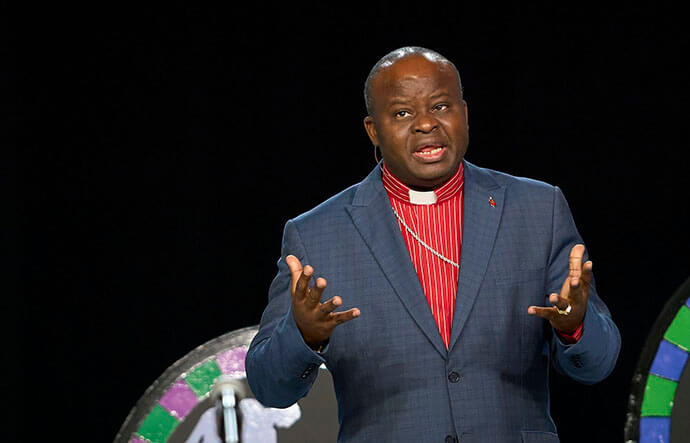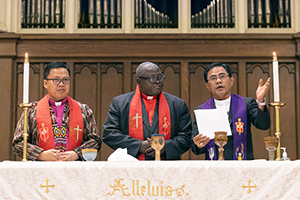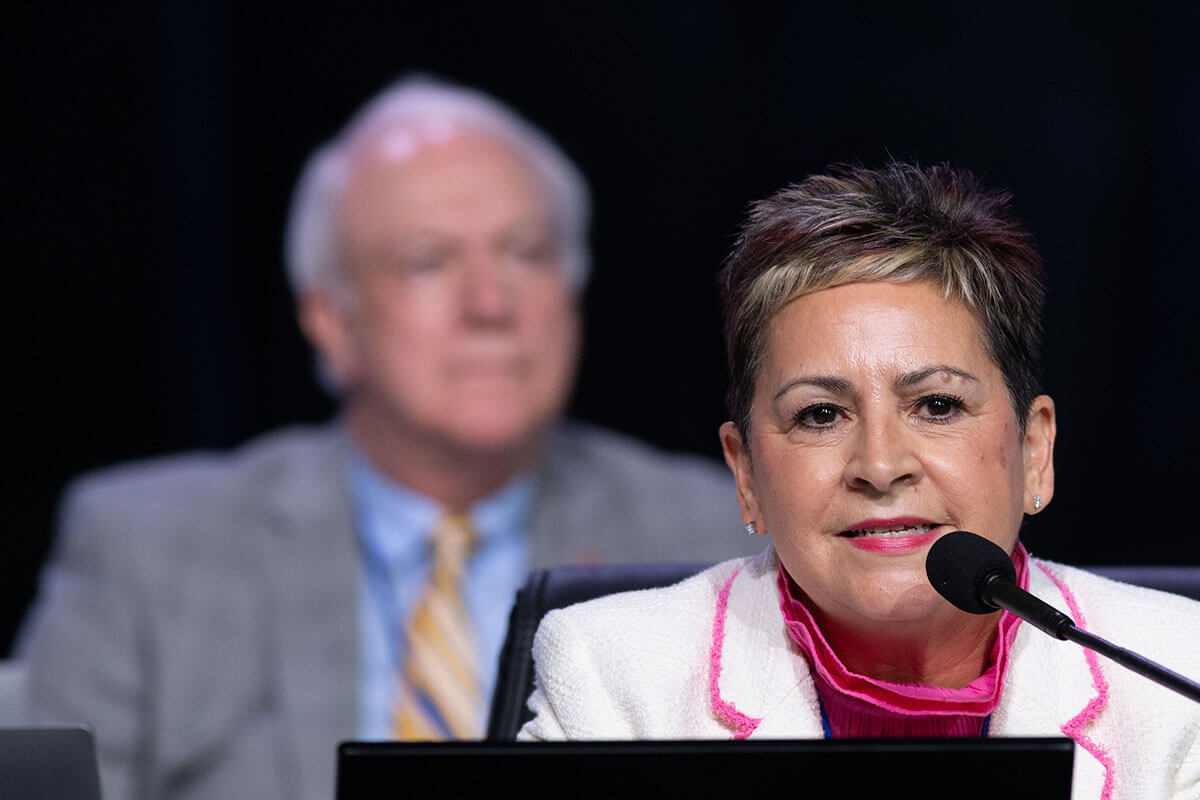Key points
- Bishops have been commenting on General Conference’s votes to remove restrictions to full LGBTQ participation in The United Methodist Church.
- Some have celebrated the decisions.
- Others have stressed to their conferences the limits of the decisions, including that they don’t require clergy to officiate at same-sex weddings.
United Methodist bishops famously have neither voice nor vote in General Conference decision-making, but they have had plenty to say since delegates moved this week to change the church’s official policies on homosexuality.
Their tone and points of emphasis have varied, with some clearly feeling exultant.
“This is a historic day that has been decades in the making,” said Iowa Conference Bishop Kennetha Bigham-Tsai on May 1, in a video posted after delegates lifted a ban on LGBTQ ordination. “We have finally beaten our swords into ploughshares.”
Northern Illinois Conference Bishop Daniel Schwerin shared in a Facebook video that he was celebrating the General Conference actions.
“I’m so grateful for the freedom, the justice and mercy for our LGBTQ siblings and for those who love them,” he said.
Other bishops acknowledged that the actions of this General Conference will have a mixed reaction in the churches they oversee.
“I know that some of you are celebrating, some are mourning and some are uncertain about what your future holds — for the denomination, for your local church and perhaps even for yourselves as followers of Jesus Christ,” said South Carolina Conference Bishop Jonathan Holston.

In areas hard hit by disaffiliations, bishops stressed what the changes mean — and what they don’t.
“First, pastors have always decided who they will marry,” said Tennessee-Western Kentucky Conference Bishop William McAlilly in a written message to his conference. “This has not changed. Pastors will continue to decide who they will marry. There is no mechanism in conference leadership nor desire on my part to determine who a pastor will marry.”
Bishop David Graves of the Alabama-West Florida and South Georgia conferences noted in a statement that petitions to change the church’s position on human sexuality were approved on the consent calendar, reserved for non-controversial legislation.
“While it might seem unusual for such a significant topic to be voted through on a consent calendar, it represents a spirit of love and unity,” he said in a statement. “This General Conference has placed a considerable amount of trust in the legislative committees, which met last week. There has been very little debate about most petitions because the committees were thorough with their work.”
Graves also addressed the matter of pastoral appointments.
“Let me clarify that a church is not required to receive a gay pastor,” he said in a statement. “Like any clergy appointment, an extensive consultation process will happen between the local church, district superintendent, cabinet, bishop and (staff parish relations) committee to ensure the church and incoming pastor are honored.”
Subscribe to our
e-newsletter
Bishops from the central conferences — church regions in Africa, Europe and the Philippines — offered comments to UM News on General Conference’s move toward full LGBTQ inclusion.
North Katanga Area Bishop Mande Muyombo said that African United Methodists will continue in a traditional understanding of marriage as between one man and one woman. But he said that this General Conference’s passage of regionalization legislation will enhance Africans’ ability to be “authentic” in their faith while remaining in connection with United Methodists who see things differently.
“I see a great future for The United Methodist Church in Africa,” he said.
East Africa Area Bishop Daniel Wandabula applauded regionalization but said the church’s new stances on human sexuality “will have a legal, spiritual and ministry impact on some of our countries in Africa.”
He added, “While I do not know the extent of the impact that these petitions will have on the UMC in the East Africa Area, I know that as we continue to live in the new realities of The United Methodist Church, we will have to develop new ways of partnerships and doing ministries together.”
Bishop Christian Alsted gave a European United Methodist perspective in an email response.
“General Conference’s decisions on regionalization and of giving the central conferences authority to set policies and boundaries for marriage, ordination and licensing for ministry and enabling them to delegate the same authority to annual conferences will empower the global church to move forward out of decades of conflict into a time with renewed focus on our mission to make disciples of Jesus Christ for the transformation of the world,” said Alsted, who oversees the Nordic-Baltic Episcopal Area.
Many bishops have underscored the generally harmonious spirit in Charlotte.
Texas Conference Bishop Cynthia Fierro Harvey presided in the late afternoon plenary of May 1, and she told delegates she still had a touch of post-traumatic stress disorder from having presided during the contentious 2019 special General Conference in St. Louis, when restrictions against full LGBTQ inclusion were tightened.
Harvey was feeling differently this time around.
“Y’all, we are making history. We are making history,” she told delegates as the plenary wrapped up. “And I believe this is that new thing that the prophet Isaiah talks about in Isaiah 43. … I pray that you perceive it, that you recognize it, that you receive it as a gift, because God is doing a new thing, certainly in this General Conference, this United Methodist Church and certainly in each of us.”
Hodges is a Dallas-based writer for United Methodist News. Contact him at 615-742-5470 or newsdesk@umcom.org. To read more United Methodist news, subscribe to the free Daily or Weekly Digests.




